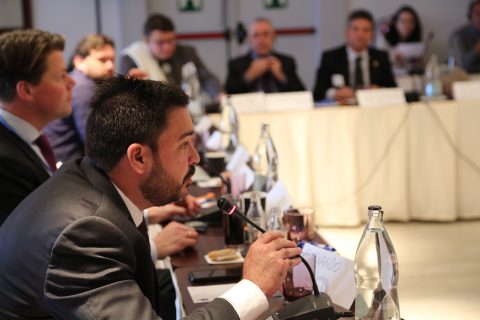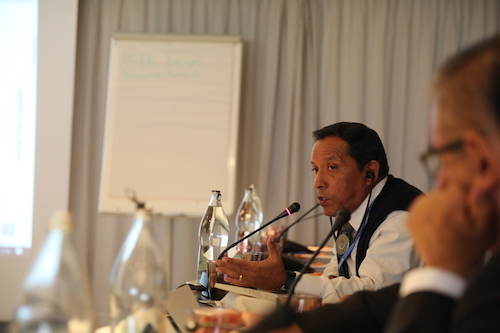EII hosts roundtable on engagement, collaboration with Amazon governments
MADRID – Regional governors, ministers and officials representing more than half of the Amazon rainforest gathered Monday in Madrid for a roundtable discussion organized by Earth Innovation Institute (EII) on ways to increase investments in their sustainability and low emission development strategies.

EII Executive Director Dan Nepstad opened the discussion by stressing the need for a deforestation agenda that “fosters inclusion and that shines a light on the advances these regions have made, which are substantial.”
His remarks prefaced the introduction of Tropical Forest Champions, which seeks to facilitate increased partnerships between tropical regions that are working to “slow the loss and speed the recovery of their forests” with the private sector.
“There are 500 companies that have come out in support of zero deforestation,” he noted, “and there are only 5 partnerships with jurisdictions. There is not enough collaboration.”
The question of climate finance is a major focus of the COP25 summit this year, including negotiations over the structure of carbon markets, whereby companies and governments can offset their emissions through payments to regions with reduced emissions.
California’s recently passed Tropical Forest Standard, which sets strict guidelines over how and where payments for carbon offsets can be made—indeed the Standard is often referred to as a model for the broader market – opens the door to increased financing opportunities for regions like those represented at the event.
Monday’s meeting was held on the sidelines of the ongoing UN COP25 climate summit in Madrid, where the terms of Article 6 of the Paris Climate agreement, which deals with carbon markets, are among the key items being discussed.
Rosângela Benjamim, state secretary of Industry and Trade for the state of Acre, Brazil stressed that any agreements between the private sector and Indigenous communities needs to have specific language dealing with such concerns as intellectual property rights and profit sharing. “Companies will often come into the Amazon and just take local products,” she said, with little in the way of legal recourse for local communities.
“This is a question about quality of life,” said Pedro Bogardín, governor of San Martín, Peru, who described efforts in his region to slow deforestation – much of it driven by illicit coca farming – through strategies that improve agricultural productivity while helping to increase revenues for local producers without subsequent forest loss.

“We need to give dignity to farmers, or they will not partner with us on the climate,” he said, adding this is as much a “moral imperative” as it is a question of finance and conservation.
Others addressed the challenges to establishing more private sector partnerships, including greater technical support for individual jurisdictions and a shifting political landscape that can make long-term commitments to conservation untenable.
“There is a stability in legal frameworks that does exist in the policy world,” noted Jose Luiz Gondin, CEO of Company for Ecosystem Services in Acre, Brazil. “We need a legal instrument that can provide continuity from one administration to another” to ensure that commitments made under one regional government survive a change in administration, either at the state or local level. “That is the kind of balance that the corporate world requires,” he said.
Lorenzo Vargas, secretary of agriculture for Caquetá, Colombia, emphasized the need for governments across the Amazon to build a stronger regional market that leverages the richness in biodiversity and people that the area sustains. “We never look to our neighbors,” he said. “While governments change, the local private sector does not. Building a stronger regional market … this is how you create public-private partnerships at the jurisdictional and at the international level.”
Despite the challenges there was a clear sense of optimism and opportunity among the officials at the table.
“We have to remain optimistic and there are a lot of reasons for optimism,” said Fernando Sampaio, executive director of Mato Grosso’s “Produce, Conserve, Include” Strategy (PCI) , one of the world’s most ambitious forest and climate strategies.
“There is a greater sense of urgency here at COP25, and a greater sense that we cannot achieve anything outside of the collaborative space,” he added. “We have to bring everyone together to advance and I think everyone understands that.”
